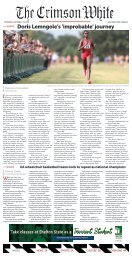Create successful ePaper yourself
Turn your PDF publications into a flip-book with our unique Google optimized e-Paper software.
I<br />
f you pulled out your laptop right now and looked up “how to<br />
be successful while in college,” you’d get 29 pages of articles<br />
by so-called experts listing strategic plans that, if followed to<br />
a “T,” end in instant success. Sadly, it’s not that easy.<br />
“I think success is kind of something everyone has to define for<br />
themselves, but for me, it’s just that I’m consistently accomplishing<br />
my goals,” said Mallory Maza, a junior double majoring in biology<br />
and political science at The University of Alabama.<br />
“To me, it’s just being able to do something that I am happy to<br />
do,” said Carey Hodovanich, a junior double majoring in math and<br />
dance at UA.<br />
<strong>No</strong> matter what success may look like to you, it takes time to<br />
achieve, and not every path to it is linear.<br />
Take Tiffany Haddish, for example. Before she was snatching<br />
trophies and making history as the first African-American standup<br />
comedian to host Saturday Night Live, Haddish was homeless<br />
and living in her car. It wasn’t until she got a little help from<br />
comedian Kevin Hart that she started to see success in her career.<br />
Her big break in entertainment didn’t come until she was cast in<br />
the 2017 box office hit Girls Trip. The film made over 100 million<br />
dollars and solidified Haddish as one to watch.<br />
<strong>No</strong>w at 40, Haddish has become a household name, covering a<br />
plethora of magazines including Times, W, and Glamour, writing<br />
a New York Times bestselling autobiography, and starring in her<br />
own comedy special on Netflix called Black Mitzvah and the TV<br />
series The Last OG alongside Tracy Morgan.<br />
While fundamentally we all know that it takes time to be<br />
successful, in a society dominated by social media, millennials<br />
have been subjected to the influx of “influencers,” like Loran<br />
Gray, Emma Chamberlain, Tana Mongeau and Jake Paul, who<br />
miraculously seem to become viral sensations and garner a level of<br />
wealth and fame so quickly that many are left wondering how and<br />
why it hasn’t happened to them.<br />
College students’ aspirations have become unachievable,<br />
not because the goals themselves are unattainable, but because<br />
the time frame in which they seek to achieve them is simply<br />
unrealistic. They begin to rank their success in correlation with<br />
others, thus creating short-term timelines for accomplishing<br />
lifelong achievements while still in their 20s.<br />
That isn’t to say that amazing achievements can’t be made in<br />
your 20s; Billie Eilish, Ariana Grande, Zendaya, Andrew Kozlovski<br />
and many more would beg to differ. The only difference is we see<br />
these successes through a social media lens narrowing our views<br />
to the wonderful outcomes and not the months of struggle and<br />
hardship behind said success.<br />
Without taking how arduous and long the journey to success<br />
may be into consideration, millennials have begun to develop<br />
unrealistic and unhealthy expectations for success.<br />
“I believe when we hold kind of those hardline expectations for<br />
ourselves that [it] really sets us up for failure and disappointment,<br />
because rarely does life go the way we expect it to,” said Greg<br />
Vander Wal, executive director of The University of Alabama’s<br />
counseling center. “It can lead to perfectionism. It can lead to<br />
disappointment, which can contribute to more anxiety or feeling<br />
down and having things like depression.”<br />
According to the American Institute of Stress, the U.S. Census<br />
Bureau reported that in 2017, of the 18 million students enrolled<br />
in college in the U.S., nearly three out of four students have<br />
experienced a sense of “overwhelming anxiety” at some point.<br />
Adulthood is already stressful enough. As college students are<br />
somehow expected to juggle full course loads, extracurriculars,<br />
and, for some, part-time or full-time jobs. However, the added<br />
stress of achieving success early on puts a strain on making quick<br />
and substansial progress in their personal or professional lives.<br />
“I think a lot of the times anxiety rises out a situation when we<br />
feel threatened, when we feel like something is in jeopardy, and<br />
oftentimes with anxiety, that’s about future possibilities, things<br />
that we feel like we have to accomplish and aren’t accomplishing<br />
or it’s not going the way we thought it would,” Vander Wal said.<br />
Success is different for everyone, but it is apparent that success<br />
doesn’t equate to much if you’re always overwhelmed and unhappy.<br />
“I think everyone thinks that they need to have a husband, a<br />
baby, and a house by like 24 or 30, and by like 30, if people aren’t<br />
married, they really start stressing out,” Maza said.<br />
Hodovanich said she admires her mother’s contentment in her<br />
career. After receiving her undergraduate degree and a law degree,<br />
her mother decided that she was much happier being a substitute<br />
teacher.<br />
Vander Wal said flexibility and self-compassion in situations<br />
where things go wrong is important.<br />
“I think sometimes we think we have to be in control of things<br />
we ultimately can’t be, and learning to accept that can be helpful,”<br />
Vander Wal said.<br />
Spring 2020 43


















